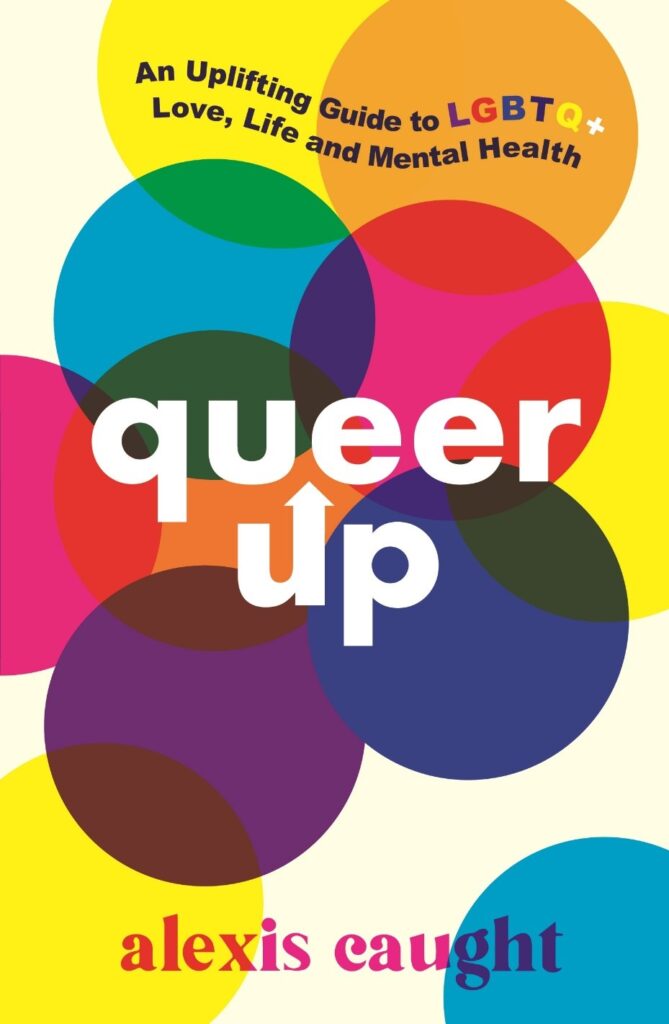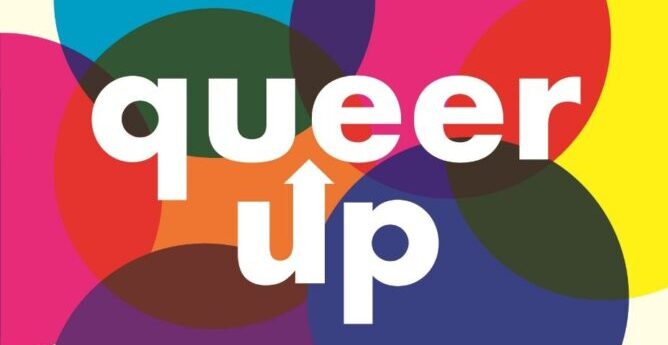Explore your identity and learn how to be a better ally with Queer Up!
Download this resource here: Alexis-Caught-Resource
Download an extract from Queer Up here: Queer-Up-Sampler
Watch Alexis’ event at Edinburgh International Book Festival 2022 here: https://www.edbookfest.co.uk/the-festival/whats-on/lgbtq-love-life-and-mental-health-with-alexis-caught

Level:
S3-S6 / KS2
Explore themes of:
√ Inclusivity √ Mental Health √ Confidence
Subject Checklist:
√ English Language √ Social Studies
Read the Extract
Taken from pages 1-43 of ‘Queer Up’.
Discussion Questions
- What is the effect of the first page of chapter one? How might people reading the book feel before and after seeing this first page?
- How would you describe the tone of Queer Up? What effect does this have?
- Look at the “Queer Alphabet” on page 7 and 8. How many of the terms are you familiar with? Which are new to you? Are there any other terms which you know of which could be included in this list?
- What evidence of LGBTQ+ people in history does Alexis list on page 10?
- What advice does Alexis give on how to handle overwhelming thoughts?
- What is an ally? What support do you think they might give to the LGBTQ+ community?


Get to Know the Author and the Book!
In Queer Up Alexis outlines lots of wonderful things which you can do to look after your mental and physical health. We’ve outlined some below. Why not give each a try and see which works for you!
Treat Yourself
On page 146 Alexis points out that we put our bodies through a lot. From dieting or unhealthy eating, to working out, and even shaving and waxing! It’s important to look after these bodies that do so much for us. Alexis lists some ways we can look after our bodies and we’ve added some of our own. Add any of your own ideas to the list below then choose some to try in your own time.
- Pampering with a bath, face mask and moisturiser
- Yoga
- Google some massage techniques online then try then out with a friend
- Masturbating (Alexis suggests a “posh wank with some low lighting”!) ]
Look After Your Mental Health
Alexis quotes the disturbing statistic that
…fifty-two per cent of LGBTQ+ people experience some form of mental health issue in their lifetime compared to an estimated twenty-two per cent of the general population. (p.164)
This shows how important it is to look after your mental health
Throughout Queer Up, in sections called “Looking After You,” Alexis, who is a trained therapist offers advice on dealing with difficult things including staying grounded, having a productive conversation and dealing with worries.
Look at The Joy Diamond on p31 and 32 of the Queer Up Sampler.
Create your own Joy Diamond with different activities which increase your chances of having a good day!
Your Turn: Introduce Yourself!
Queer Up is interspersed with introductions and stories from various people in the LGBTQ+ community. On page 40 and 41 you can read introductions from Kuchenga and Charlie, two trans women. Kuchenga and Charlie introduce themselves and talk a little about their sexual identity, how they came to be where they are today, and their work and involvement in LGBTQ+ activism.
Why don’t you write your own introduction letter to your gender or sexuality. It doesn’t need to be for anyone else’s eyes. Include aspects like when you realised these aspects of your identity, how they made you feel, any problems you’ve dealt with and who you’ve found companionship or support from.
It might be useful to read the section on terminology on p51 of Queer Up, in advance of writing your description.
Lost in Trans-lation
On page 44, Alexis defines “Trans”:
If your behaviour doesn’t conform to what is expected of your assigned gender at birth, you are quite simply gender non-conforming.
(though he states that being a man who is effeminate doesn’t make you trans… unless you feel it does.)
He goes on to say that
Looking at gender (or even sexuality for that matter) in a rigid black and white way hurts everyone, even people who are (as they like to call themselves) “normal” (or as I like to call them… “boring”.)
The gender binary is wrapped up with strict rules about what men and women can and can’t do, and who we should all be. The idea that men have to be tough and manly hurts all men, not just men who are more “feminine”, but also the tough and manly men because it puts them in a prison where they can’t show emotion or have feelings and are policed if they do.
Discussion:
List some characteristics which are traditionally associated with either masculine or feminine gender identities.
For example:
Feminine Masculine
Wears skirts and dresses wears trousers
Likes pink likes blue
Shaves their body hair Have body and facial hair
Now, think about where the following characteristics would sit in this binary gender divide, at the current time, and at different times in the past:
- Being outspoken
- Being active and playing sports
- Having a job
- Owning a house
- Doing housework and childcare
Now, consider the fact that in from the mid-16th century until the late 19th or early 20th century boys up to the age of 8 wore dresses, and in 1960s America it was law that you must always wear at least 3 items of your assigned gender’s clothing! (p191.) Even Scottish men wearing kilts could be seen as gender non-conforming!
Think of some of your personality attributes, hobbies, likes and dislikes. Would they traditionally be considered as masculine or feminine? How much of a construct does gender identity seem now!
Reflection and Further Questions
Reflection Activity
On p100 and p112 Alexis talks about family, including biological families but also “chosen families” or “logical families.” These are the friends and supporters who you are closest to and who you can rely on to provide support and understand what you’re going through.
Write a short paragraph describing your “chosen family.” How do they support you and why do they matter to you so much.
Lastly, do you have any final questions you would like to ask Alexis if you got the chance? Try to think of at least two and make a note of them.
Keep your eye out for more awesome books from Alexis Caught, as well as the other authors from the Edinburgh International Book Festival!
If you’ve been affected by any of the issues in this resource and need support then please get in touch with one of the organisations below.
Shout provide a free, anonymous text service on 85258
Mermaids provide support to transgender, non-binary and gender diverse young people.

